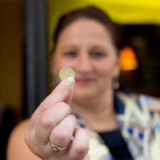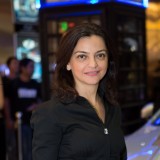A story about the eyes wide shut we have when imagining our education and the real learning we might gain if we decide to open our eyes. A glimpse of a new education. Or a vision.
1 DOLLAR, 2 IDEAS
That’s the thing about money. That – most of the times – we forget their value. The fact that money can far less valuable than ideas. Madi Sharma recently reminded me of this…
If you give me one dollar and I give you one dollar we each have one dollar. But if you share with me one idea and I share with you one idea, we both have 2 ideas.

Talking to the young audience at the Global Youth Forum in Dubai, she shared her quest to gather 7 billion ideas. And it is a quest as extremely idealistic as it is extremely feasible and valid, too.
Madi is a global entrepreneur leading the MADI Group that has development projects and organizations in fields ranging from cultural exchanges to education and up to youth entrepreneurship. As she guides her life, she strives to be the change that she wants to be in the world – no excuses, her personal version of the quote that can keep one motivated both daily and for a lifetime.
On the homepage of Extraordinary Education, a project she’s been developing in recent years, there is another lesson that we need to be reminded of more often:
We learn 10% of what we read, 20% of what we hear, 30% of what we see, 50% of what we see and hear, 70% of what we say and 90% of what we say and do.
That is why we should share ideas instead of just fighting for money. And we have so much to learn and earn because each person in front of us is telling us something, sharing ideas with us that we may not listen, pay attention to or consider. Because we are waiting for that dollar.
DOING THE LEARNING-BY-DOING PART
I challenged Madi after the Forum to tell me how she sees learning nowadays through her vision of worldwide sharing, from the way educational systems work to the gap we have between online technologies and learning and up to the way we seem to misunderstand the world altogether.
Schools are not about learning. They should be about teaching you how to learn. They are filling your brain with things that might be useful somewhere in your life. But the real learning comes from learning by doing – from the university of life, what one can learn every day, in every circumstance. The more you will do in a day – whether that is online learning, meeting people, working in a community, volunteering – the more you will learn. Every second is a learning opportunity.
Madi stresses that it is about every second, not any kind of second. She points out that young people should make themselves a service and get out of their comfort zone in order to learn because if someone sits in front of the TV all day long or if goes out with the same friends every day, they are not going to learn anything new.
There’s a lot to learn online – in my case, whenever I have 20 minutes, I go and watch a TED video. I’m also learning French online because the technology allows this kind of learning to fit with my schedule.
But she warns about the fact that online technologies are more and more considered as the ultimate solution for enriching every moment of our lives by learning. Sometimes, technology is misused exactly because it is thought to be able to suit all types of learning purposes.
Just to give you an example: I recently did an online learning program for an organization where I had to do a presentation online to a group of students. I’ve sworn I’ll never do it again. I couldn’t see the faces of the people I was talking to – if people can’t see your eyes and feel your passion, genuine purpose; you can’t communicate or inspire them.
Everything in her approach revolves around applied learning – face-to-face learning, learning by doing, learning from role models. Junior Achievement is one organization that Madi appreciated along the years for its focus on the learning by doing principles as it is teaching and guiding children and teenagers on how to set up their own mini-companies.
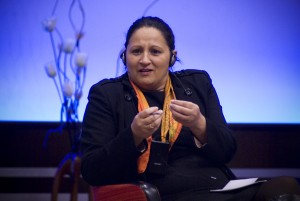
She is also promoting these principles through the Extraordinary Education program where young people get into the real world and sell real products. During the program, they understand why they should learn new languages, why they should learn math, why geography is relevant if you want to sell things across borders, how to communicate with people, where innovation comes from, where one gets his staff from, and learning truly happens as a underlying experience to all this process.
There are many other programs like these but the problem is that they are not part of the curriculum – this is what we need to change. Take for example, the coding classes in school that are really changing kids’ lives because they are extremely relevant for today’s market and workforce.
THE ANGEL (INVESTOR) OF ONE’S LIFE
By looking back at her life, Madi has also realized that we sometimes misinterpret or even overlook learning experiences that later on turn out to be essential for our careers or entrepreneurial endeavors.
My first learning moment was the one a person never appreciates – the work your parents make you do – the chores you do in the house. You don’t value it and you don’t see it as important at the time because it keeps you from seeing your friends. I realized much later in life that that was the work that gave me the independence in life that I needed to survive.
Her kids went through the same kind of experience: By the age of 12, they were the most successful kids on the street because they were the only ones who could open up a fridge and produce a full meal.
The independence thread is more and visible throughout her growing up: During holidays, I and my sisters were working with my dad in his factory – it was a family business. We were treated like the other members of the staff – we swept floors, we packed jumpers, we made tea. And we got to understand real people and their struggles, we got to understand business and how hard business was. And because we were a family, we were a team. This helped me set up my own company when I actually had nothing.
Again, her kids went through the same kind of experience: Yes, my kids helped me during their holidays with my factory and, as a result, they can now run their own businesses. And think about this: while they were in school, they were teaching business because they had more relevant experience than the teacher.
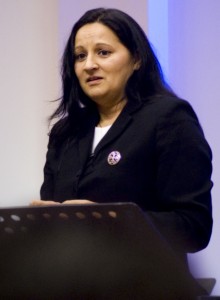
Last but not least, she talks about negative experiences as sources of learning. Successful people have a worst, most difficult moment when they learn how good life is and their capacity to learn and work after that moment stems from the fact that they never want to return to that moment ever again. Madi has gone through domestic violence and learnt to have no fear anymore and to lift herself from poverty despite the fact that se had no qualifications and no financial independence whatsoever.
All these experiences taught her about real world entrepreneurship. About the fact that knowledge should not be assimilated only in classrooms for the sake of qualifications but should be tested, adapted and used for the real world experiences.
Entrepreneurial education should complement the existing curriculum of schools but it should be relevant and mainstreamed – that is, it should be embedded into all areas of the curriculum. Take geography, for example: talk to students about where various resources are in the world, why different countries have different strategies regarding their resources. Take history: talk to students about how Napoleon managed to conquer half the world in the 1700s and how today we still can’t manage to talk to our neighbors and drop bombs on each other.
Madi recalls hating history in school. But now she cannot put down the history books because she’s finding solutions to problems she is currently trying to solve. This is why she considers that curricula should focus on the challenge aspect of understanding and not just assimilating knowledge.
While learning by doing is still not a method applied in all educational systems across the world, the new trend of self-learning is rising as an answer to this. The self-made entrepreneur considers that people learning by themselves are the best people because they are the ones who know what they want to do.
If you ask a 5 year old what he wants to do, he will tell you that he wants to be an astronaut, a football player, you name it. The education system takes creativity away; it knocks it out of the kids. In school, kids you hear the word no in a systematic way for the first time – No, you can’t. Don’t do that, you must do that.
She encourages all the people who finished school to go back and tell students how they do what they are doing right now, how they felt during school, what bits of learning they actually used in real life, etc. Malala Yousafzai comes to her mind with her warning: If we don’t educate people, they will be open to others’ interpretation. In a world so hyped on materialism where people are driven to feel that there is always something missing, Madi Sharma is one of the people who tells youngsters that they are capable of creating their own job nowadays.
Look at Steve Jobs, look at Richard Branson, she adds. There is a need to put more inspirational people in front of teenagers. They do not (only) need mentors. They need role models. Mentors are there to challenge your brain but they do not walk you through the doing.
When I started my food factory, I was an Indian woman, single, beaten, divorced but I became a role model for my staff and for the people around me because once I started something, they joined me. You have to set the example. Unless you’re going to have a go, you won’t know how to do it.
Closing the circle on her strong belief in learning by doing, she tells me that this type of learning is the one capable of ensuring that we still have a chance to keep up with the pace of the world.
I think we have a gap in understanding where the world is going, not only between education and learning. Education is not filling that gap right now. Think about the fact that there are teachers in their jobs for 20, 30 or even 40 years teaching the same books. No wonder the kids today are bored – it’s not relevant anymore.
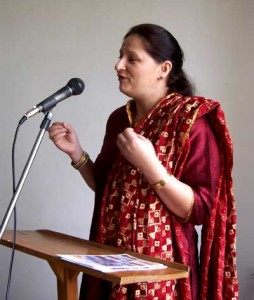
She argues that kids need to learn relevant things related to where the world is going and how it is developing. At the same time, she acknowledges that the world is developing too fast right now for those of us who are in it to know where it is going. In this context, the rhetorical question arises: how can teachers keep up with it?
But there is a solution in her perspective – for learning to flexible enough so that it can be tailored to the individual and offer him the best that he can have. In order to do that, the education system needs to understand what the individual is passionate about, what he wants to do and help him figure out how he can achieve it. The most important thing for him is to start walking on that path and learning will happen along the way.
If you ask an employer today where his business or industry will be in 6 months and what skills will be needed, he won’t know the answer.
THE UNKNOWNS OF THE KNOWLEDGE-BASED ECONOMY
Madi changes the thinking hat of the entrepreneur for that of European Economic and Social Committee member: And education could be a solution provider for this conundrum. But look at Europe, for example. According to the Lisbon strategy, Europe is supposed to become the greatest knowledge-based economy by 2020. But we are not on track – far from reaching the targets.
She considers that too much focus is put solely on trade and economics: Europe is in the middle of falling apart and it’s sad because it has so much to offer. We have 20 million jobless people and we don’t invest enough in sustainable development, in healthy and educated people and this happens because politics are usually about empty words without leading to structures for implementation.
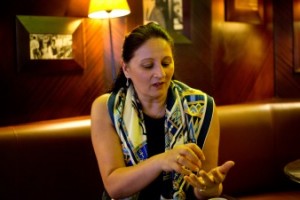
Madi Sharma has many roles and projects that can lead her to her goal of generating 7 billion ideas – at least one from each one of us. Underneath all these, she is a tremendous learner, capable of making people understand that any little thing or situation that seemed meaningless to them is an entire school that they’ve overlooked.


